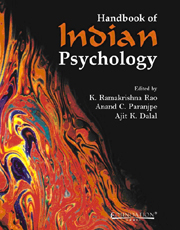Book contents
- Frontmatter
- Contents
- Contributing Authors
- Preface
- 01 Prologue: Introducing Indian Psychology
- 02 Indian Thought and Tradition: A Psychohistorical Perspective
- PART I SYSTEMS AND SCHOOLS
- PART II TOPICS AND THEMES
- 16 Indian Theories of Perception: An Inter-School Dialogue from Buddhist Perspective
- 17 Indian Psychology of Motivation
- 18 Personality in Indian Psychology
- 19 “Giving” as a Theme in the Indian Psychology of Values
- 20 The Making of a Creative Poet: Insights from Indian Aestheticians
- 21 Anchoring Cognition, Emotion and Behaviour in Desire: A Model from the Bhagavad-Gītā
- 22 Consciousness
- 23 J. Krishnamurti: Freedom from Knowledge
- PART III APPLICATIONS AND IMPLICATIONS
- Pronunciation and Transliteration of Sanskrit Alphabet
- Glossary
- Index
21 - Anchoring Cognition, Emotion and Behaviour in Desire: A Model from the Bhagavad-Gītā
from PART II - TOPICS AND THEMES
Published online by Cambridge University Press: 26 October 2011
- Frontmatter
- Contents
- Contributing Authors
- Preface
- 01 Prologue: Introducing Indian Psychology
- 02 Indian Thought and Tradition: A Psychohistorical Perspective
- PART I SYSTEMS AND SCHOOLS
- PART II TOPICS AND THEMES
- 16 Indian Theories of Perception: An Inter-School Dialogue from Buddhist Perspective
- 17 Indian Psychology of Motivation
- 18 Personality in Indian Psychology
- 19 “Giving” as a Theme in the Indian Psychology of Values
- 20 The Making of a Creative Poet: Insights from Indian Aestheticians
- 21 Anchoring Cognition, Emotion and Behaviour in Desire: A Model from the Bhagavad-Gītā
- 22 Consciousness
- 23 J. Krishnamurti: Freedom from Knowledge
- PART III APPLICATIONS AND IMPLICATIONS
- Pronunciation and Transliteration of Sanskrit Alphabet
- Glossary
- Index
Summary
Psychologists have argued about the primacy of cognition and emotion for decades without any resolution. Deriving ideas from the Bhagavad-Gītā, in this paper, cognition, emotion, and behaviour are examined by anchoring them in desire. The model presented here posits that cognition, emotion, and behaviour derive significance when examined in the context of human desires, and starting with perception and volition, cognition emerges when a desire crystallizes. Desires lead to behaviours, and the achievement or non-achievement of a desire causes positive or negative emotions. Through self-reflection, contemplation, and the practise of karmayoga, desires can be better managed, which can help facilitate healthy management of emotions. It is hoped that insights provided by this model would stimulate research for further examination of the role of desire in understanding and predicting cognition, emotion, and behaviour. The model presented here is yet another example of how indigenous psychologies can contribute to universal psychology (see Bhawuk, 1999, 2000, 2003 and 2005 for other examples).
Presenting the template of “global-community psychology”, Marsella (1998) entreated researchers to replace the Western cultural traditions by more encompassing multicultural traditions, and reiterated the need to emphasize the cultural determinants of human behaviour, which has been discussed in the literature (Triandis, 1972,1977,1994; Gergen, Gulerce, Lock, and Mishra, 1996; Pawlik, 1991). He recommended the systems orientation and noted that many indigenous psychologies are well equipped to deal with ascending dimensions of behavioural contexts, from individual to family to society to nature to spirituality. He further proposed that qualitative research including such methods as narrative accounts, discourse analysis, and ethnographic analysis should be encouraged.
- Type
- Chapter
- Information
- Handbook of Indian Psychology , pp. 390 - 413Publisher: Foundation BooksPrint publication year: 2008
- 26
- Cited by



